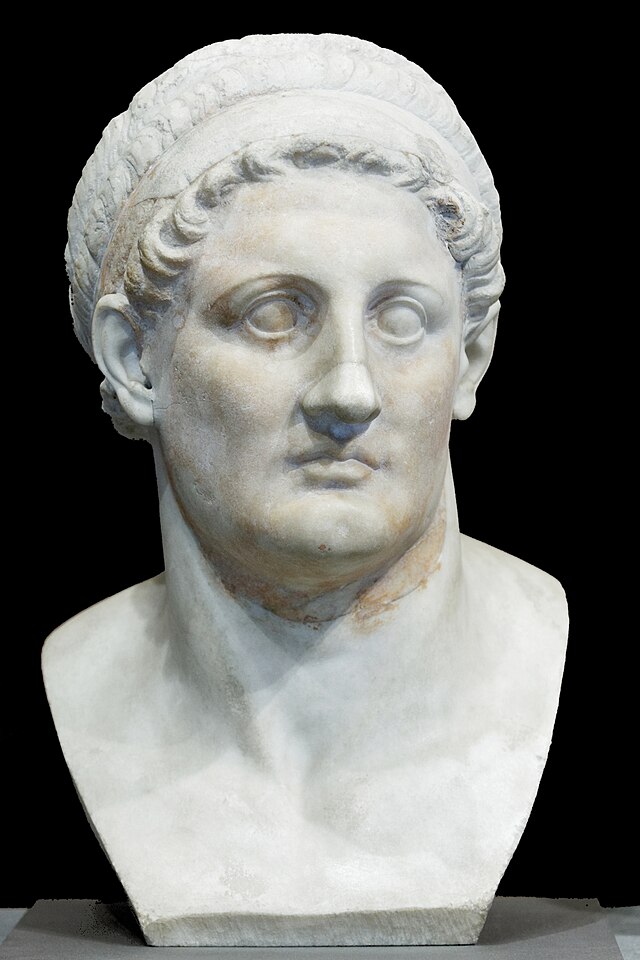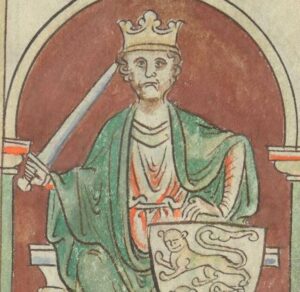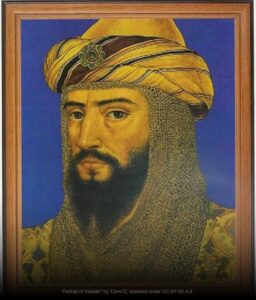In the mid-fourth century BCE Macedonia was still a rough border kingdom, half Greek, half Balkan, perched between the cultured polis of southern Greece and the wild hill-tribes of Thrace and Illyria. In one of its upland districts a boy named Ptolemy—“warlike” in Greek—was born around 367 BCE.
His father, Lagos, was a middling land-holding noble who owed military service to the king; his mother, Arsinoë, may have possessed a sliver of royal blood. Later Alexandrian poets would whisper that Arsinoë had once caught the eye of King Philip II, making her son a half-brother to Philip’s heir Alexander.
There is no proof, yet the rumor lingered because it felt plausible: Ptolemy’s future was so spectacular that people searched for supernatural clues in the cradle.
Macedonian childhood trained youngsters less for letters than for arms. At dawn Ptolemy and the other boys galloped bareback over stumbled fields, practicing the one-handed mount that would someday let them vault onto cavalry horses while gripping a spear.
They learned to strip bark for winter fires, to read the sky for sudden Thracian raids, and above all to obey trumpet calls. But the boy was also curious. When traveling bards recited Homer under a moonlit courtyard, Ptolemy mouthed the lines until he could repeat whole passages about Odysseus’ tricky courage.
That ability to combine martial grit with mental agility would mark him out in a kingdom where most nobility excelled at only one or the other.
He grew up in a world sharpened by Philip II’s reforms—longer spears, tighter ranks, a cavalry that could turn battles in a single breath. Boys of rank were sent to the court as pages, educated in hunting, war, and the sly clarity of politics. Ptolemy learned to read spears and faces. He learned when to be seen, and when to be indispensable.
When Aristotle came to Macedon to tutor Philip’s son, Ptolemy was nearby in the charmed orbit of the prince. He was not the brightest star in that sky; that honor belonged, inevitably, to Alexander. But Ptolemy had a gift that the dazzle of genius sometimes lacked: steadiness. He remembered details. He watched and waited. He knew the value of tomorrow.
Ptolemy I in the Army
In 336 BCE, Alexander became king. By 334, he led Macedon’s patched-together empire across the Hellespont. Ptolemy crossed with him as one of the hetairoi, the Companion cavalry, and—before long—as one of the king’s intimate circle of bodyguards (somatophylakes). You can still read Alexander’s campaigns as Ptolemy told them: the first great historian of Alexander was not a professional scribe but the man who rode near him, fought beside him, and later wrote his memoirs so carefully that the historian Arrian would rely on them centuries later. Ptolemy’s version of Alexander—the tireless commander, the man who could pull a plan out of a cliff face—is a portrait painted by someone who had learned that memory is a form of power.
The hits of Alexander’s early years are familiar: the river of spears at the Granicus (334), the narrow, desperate pivot at Issus (333), the impossible siege of Tyre (332), and the welcoming sands of Egypt soon after. Ptolemy appears in the sources with a soldier’s sturdiness. He is sent on fast raids; he shepherds detachments that must move cleanly and return intact. He helps quell uprisings in the Persian heartlands and, later, fights in the wild wars of Bactria and Sogdiana where the king is forced to invent new tactics for a war that never holds still. At one point, Ptolemy takes part in the hunt for Bessus, the satrap who murdered Darius III; Alexander needs a corpse to crown his own claim to Persia, and Ptolemy helps bring in the man who dared call himself king.
If Alexander is the lightning strike, Ptolemy is the conductor that carries the current. He is frequently close to the king during the great set-piece battles—near enough to learn how Alexander thinks about terrain, momentum, and morale; near enough to see how he uses myth and pageantry to keep men marching toward the edge of the map. Ptolemy watches Alexander invent himself as a living legend. He also watches the cost.
The long shadow of Egypt
In late 332 BCE, Alexander entered Egypt as a liberator from Persian rule. The priests of Memphis greeted him with the traditions of pharaohs, and in that moment Alexander found a form of kingship that would outlive him. He cut a new city into the coastline—a line in the sand that would become Alexandria—and then rode out across the desert to the temple of Ammon at Siwa, where oracles turned kings into sons of gods.
Ptolemy, riding behind, saw more than ceremony. He saw an administrative system that ran on temple alliances and land registries; he saw a sacred topography that could be honored, used, and—if needed—reshaped. He saw, in short, a place one could govern, not just conquer. Many of Alexander’s generals fell in love with glory. Ptolemy fell in love with Egypt’s possibilities.
Alexander’s last campaign and the problem of immortality
By 326 BCE, the army reached India. At the Hydaspes, Alexander delivered one of his great tactical performances; at the Mallian city, he nearly died. Ptolemy, like everyone else, was pulled into the frantic work of holding together an empire stretched thin by its own success. Anyone watching carefully would have noticed that Alexander had not named a clear successor; he had a half-brother with cognitive challenges and a newborn son not yet born when the king took his final fever in Babylon in 323 BCE. The man who wanted to be Achilles left behind no heir who could carry Achilles’ armor.
Ptolemy had watched Alexander build a fabric of control from proclamations, marriages, garrisons, and gods. He had learned the second lesson of empire: if you want immortality, you must build a home for the memory of your name. Alexander had founded cities everywhere; but the one that could hold his legend was Egypt’s Alexandria.
The day the world broke: 323 BCE
When Alexander died, the tent walls seemed to billow. Grief was real, but grief was also strategy. The generals—Perdiccas, Antipater, Seleucus, Lysimachus, Antigonus, and Ptolemy among them—held hurried councils. They sought a compromise that might hold: the kingship would be vested in Alexander’s half-brother Philip III Arrhidaeus and, if the child of Roxane (Alexander’s pregnant Bactrian wife) was a boy, in that baby as Alexander IV. Real power, though, would reside in regents and satraps. The empire was apportioned like an estate with too many heirs; each man accepted a governorship that looked temporary and behaved as if it were forever.
Ptolemy moved quickly to secure the prize he had already chosen in his heart: Egypt. In the so-called Partition of Babylon, he became satrap of Egypt (with Cyrenaica, Libya, and parts of Arabia often in the bargain). He arrived in Memphis not as a looter but as a dentist: removing abscessed officials and keeping the jawline smiling. He executed Cleomenes of Naucratis, the grasping administrator whom Alexander had left behind—the kind of move that risks backlash if you have misread the priests and the merchants. Ptolemy had not misread them. He restored confidence. He paid the soldiers on time. He kept the Nile’s taxes flowing. He was not flashy; he was effective.
And then he did the most audacious thing of his life.
The stolen body
In ancient politics, bodies have a way of becoming banners. The cortege of Alexander—his body preserved in honey, his funeral carriage a mobile temple—began to move from Babylon toward Macedon, where the king was meant to join his ancestors. Perdiccas, as regent, wanted the body under his control; it would let him claim the right to speak for the dead, to bless the living. Ptolemy understood that whoever housed Alexander’s remains would also house his myth.
Somewhere in Syria—sources place it near Damascus—the caravan met a polite, irresistible detour. Ptolemy’s agents took possession of the body and diverted it south to Egypt. At Memphis, Alexander received the rites of a pharaoh; later—probably under Ptolemy’s son, though Ptolemy may have planned it—the body was moved to Alexandria, to a gleaming tomb called the Soma. There, for centuries, the living could make pilgrimage to the memory of the conqueror while kneeling to the kings who tended that memory. It was propaganda with incense: a foundational myth installed like a lighthouse for the soul.
Perdiccas responded as regents do when symbols slip away: he marched on Egypt (321 BCE). The invasion ended with disaster at the Nile, where engineering, crocodiles, and mutiny conspired against him. In the confusion and rage, Perdiccas’s own officers killed him. Egypt remained Ptolemy’s.
The Wars of the Successors: craft against fury
The two decades after 323 were a prolonged thunderstorm known as the Wars of the Diadochi—the successors. Alliances were made like sandcastles and washed away just as quickly. You can try to memorize every switchback of the coalitions, or you can focus on Ptolemy’s consistent style:
- He fought to defend, not to chase. Ptolemy rarely pursued deep continental campaigns. He preferred to secure Egypt, the Delta, Cyrenaica, and, when possible, the coastlines and islands that made Egypt a maritime power. He understood that a rich, defensible core could outlast a feverish frontier.
- He used other men’s ambitions as tools. When Seleucus needed help to reclaim Babylon, Ptolemy backed him by defeating Demetrius at Gaza (312 BCE), a victory that opened the door for Seleucus’s return east. When Antigonus Monophthalmus tried to turn himself into a new Alexander, Ptolemy helped knit together coalitions to check him.
- He accepted losses without hysteria. Demetrius beat Ptolemy badly at Salamis (on Cyprus) in 306 BCE. Antigonus celebrated and declared himself king, granting the royal title also to Demetrius. Rather than flail, Ptolemy regrouped. Soon every major successor took the bait and assumed royal titles. The fiction of a united empire quietly died. Ptolemy became basileus of Egypt.
- He made friends that mattered. When Demetrius besieged Rhodes (305–304 BCE), Ptolemy sent aid. The grateful islanders gave him the epithet Soter—“Savior.” The name stuck to his dynasty like a blessing. Helping Rhodes wasn’t just altruism; it secured Egypt’s maritime lanes and anchored Ptolemy’s influence in the Aegean. In time he would organize the “League of Islanders,” a web of influence across the Cyclades maintained by ships rather than catapults.
In the end, Antigonus fell at Ipsus (301 BCE), crushed by a grand alliance. The map stabilized into the Hellenistic kingdoms we teach schoolchildren to name: Seleucids in Asia; Antigonids in Macedon; Ptolemies in Egypt. That settlement wasn’t a peace; it was an armistice robust enough for governments to grow roots.
Building a kingdom that could last
Ptolemy did not think of Egypt as a treasure chest; he thought of it as a machine. He inherited an administration that could weigh grain in one district and predict taxes in the next; he kept it, strengthened it, and—crucially—put Macedonians and Greeks at the top of its command chains while leaving much of the local machinery in Egyptian hands. His system ran on a few interlocking ideas:
- Land and soldiers. Ptolemy granted plots to his soldiers (kleruchs), tying their prosperity to Egypt’s fields. A veteran with a farm is a man with a stake in the harvest and the shield.
- Temples as partners. He did not strip the priesthood; he courted it. He restored temples, funded festivals, and learned to speak the ancient grammar of legitimacy—the names and rituals that made a pharaoh a pharaoh. In temple reliefs, Ptolemy appears in Egyptian regalia offering to the gods. In Greek inscriptions and coins, he is a Macedonian king. He was bilingual in power.
- Money that stays home. Over time, the Ptolemies developed a tightly controlled monetary system with their own weight standards and strong royal mints. Egypt became a closed fiscal world, efficient and hard to siphon. That meant they could pay fleets without begging the Aegean for coins.
- A city as a promise. Alexandria became the heart and face of the kingdom. Ptolemy made it his capital and poured resources into its harbors, warehouses, and neighborhoods. The city was a planned argument: Greek street grid, Egyptian grain, Near Eastern trade, and a cosmopolitan population that learned to love the easy cash of export and the peculiar glamor of a city that could imagine itself the center of the earth.
- A navy with places to go. Ptolemy’s Egypt was not a desert kingdom; it was a maritime state. Control of Cyprus, friendly Rhodes, and a net of island garrisons gave him reach. Egypt’s wheat fed the Aegean; Egypt’s ships policed it.
The cult of memory: Alexander, Serapis, and the royal image
The most important building block of Ptolemy’s legitimacy was someone else’s fame. Housing Alexander’s body in Alexandria allowed Ptolemy to present himself as the guardian of the conqueror’s legacy. He minted coins that echoed Alexander’s iconography—rams’ horns of Ammon, elephant headdresses, heroic profiles—while subtly shifting the frame to point toward the steward rather than the vanished master.
At the same time, Ptolemy encouraged religious fusion that felt natural rather than forced. The cult of Serapis—a god with Egyptian bones and Greek flesh—took form in this period. Whether Ptolemy invented Serapis or simply promoted a rising syncretism is a scholarly debate; what matters is how the cult functioned. Serapis blended Osiris (Egyptian lord of the afterlife) with aspects appealing to Greek sensibilities (healing, abundance, a paternal gravitas). In the Serapeum, Greeks could worship without feeling linguistically or aesthetically alien; Egyptians could find their cosmos respected rather than erased. It was a political miracle disguised as theology.
Ptolemy also understood theaters, libraries, and institutions as tools of kingship. He invited the exiled Athenian statesman Demetrius of Phalerum to Alexandria and set him to work envisioning a royal research center. Under Ptolemy and, more programmatically, under his son, the Mouseion (a community of scholars) and the Library of Alexandria took form. If you picture walls of papyrus scrolls, you’re already thinking like a Ptolemy: knowledge as an infrastructure, not just a boast. The story that Ptolemy once asked Euclid for a simpler path to geometry and was told “there is no royal road” belongs to the family tradition: whether it happened or not, it signals how the dynasty wanted to be remembered—philhellenic, curious, surrounded by people whose tools were ideas.
And then there was the Pharos, the lighthouse of Alexandria. The colossal tower most likely rose under Ptolemy II, but the elder Ptolemy chose the city, the harbor plan, and the administrative ambition that made such a project inevitable. A lighthouse is a military instrument and a metaphor; Ptolemy meant both.
Wrestling with the neighbors
None of this was possible without fighting. The Seleucids and Ptolemies bickered over Coele-Syria like quarreling landlords, and each generation found new reasons to test the frontier. Ptolemy’s policy was pragmatic: take land that secured his line of communication, release land that bogged down infantry, and never let a field campaign risk the Delta. When Cyprus wavered, he fought; when the Aegean needed money, he sent ships and subsidies. He preferred coalitions to heroics and admired walls that didn’t need daily prayers.
An emblematic story belongs to Rhodes. When Demetrius launched his spectacular siege, Ptolemy’s aid wasn’t just decisive; it was symbol-shaping. Being called Savior offered a cleanly Greek honor that echoed, in a new key, the Egyptian legitimacy he’d earned from priests and rituals. Ptolemy worked both sides of his cultural frontier with an almost modern sensitivity: in one world, a Pharaoh who offers maat—cosmic order; in the other, a Hellenistic king who saves allies and funds poets.
Love, succession, and the problem of sons
Dynasties are not built on institutions alone. They are stitched with marriages, and then re-stitched when politics require different seams. Ptolemy married Eurydice, daughter of the regent Antipater, a union that linked him to Macedon’s old guard. Later he married Berenice, whose intelligence and influence would shape the next generation. The choice that defined his house was a hard one: he bypassed an elder son (Ptolemy Keraunos, child of Eurydice) and designated as heir Ptolemy II Philadelphus, his son with Berenice. It was a decision that prioritized stability in Egypt over claims abroad. Keraunos, passed over, would eventually seize the Macedonian throne and die violently. Philadelphus would settle into the long work of turning his father’s balanced improvisation into a system.
By the early 280s BCE, Ptolemy was old, tired, and successful. He abdicated—an act of serene confidence rare in any age—and let the younger Ptolemy rule while the elder lingered as the living founder. He died in 283/282 BCE, leaving behind a kingdom that worked, a city that gleamed, and a dynasty with a playbook.
How Ptolemy legitimized rule in a mixed world
Egypt under Ptolemy I was not simply “Greek” wearing Egyptian masks. It was a deliberately mixed world designed to let different communities recognize themselves in the state. His strategy had several layers:
- Dual imagery. In temple reliefs and on the Rosetta-Stone-style decrees that would later proliferate, the king appears as a pharaoh offering to Egyptian gods—complete with traditional titulary. In Greek contexts, he is a basileus, a Macedonian commander-king in the lineage of Heracles and Zeus Ammon. No single image is the whole truth; together, they are a functional truth.
- Priestly partnership. Ptolemy did not impose a Greek religious regime. He funded Egyptian temples, respected local calendars, and convened synods of priests whose decrees recognized royal benefactions. The priests, in turn, produced the language of legitimacy that made Greek rulers feel native on the Nile.
- Cultural hospitality. Alexandria became a city where Greek theater, Egyptian processions, and Near Eastern merchants all had places to stand. The court supported scholars and artists not as ornaments but as a working part of the regime’s brand: refined, rational, open to talent, and slightly dazzling.
- Administrative realism. Egyptians continued to staff much of the village-level administration and temple economy; Greeks and Macedonians dominated the army, the finance ministry, and the provincial governorships. This two-tiered system could be unjust and brittle, but in Ptolemy’s hands it was also predictably managed—crucial in a land where grain yields, not glory, fed ships.
- A founding myth everyone could touch. Alexander’s tomb was not locked behind priestly doors. It became a perennially visited site of political tourism. Rulers, ambassadors, and merchants could pay their respects. Ptolemy’s message was simple: in Egypt, the past is safe, and the future is profitable.
What he did that mattered most
It helps, near the end, to list the accomplishments that made Ptolemy more than a regional warlord:
- He secured and professionalized Egypt. He turned the satrapy he was handed into a sovereign state with internal coherence and external posture. He reformed and expanded the land-grant system for soldiers, stabilized revenue, and curated an elite that thought in terms of administration rather than plunder.
- He mastered maritime strategy. Ptolemy built and maintained a navy, a network of bases, and alliances (Rhodes above all) that turned Egypt into the eastern Mediterranean’s banker of grain and guarantor of certain sea lanes.
- He used memory as policy. By securing Alexander’s body, minting coinage that spoke the language of the old hero, and overseeing a city that wore Alexander’s name, he transformed a dead man’s charisma into living capital.
- He stewarded cultural institutions. The Mouseion and Library—articulated under him, flourished under his son—were not mere vanity projects. They were soft power: a promise that Alexandria was a capital of the mind. Scholars such as Zenodotus, Callimachus, and, by tradition, Euclid found a home that kings maintained because knowledge made their kingdom legible to itself and admirable to others.
- He navigated succession wisely. By abdicating to Ptolemy II and endorsing Berenice’s line, he eased the transition from founder’s charisma to heir’s bureaucracy. Dynasties often fail at the second step; Ptolemy made it look almost calm.
- He framed a durable ideology. The blend of Greek kingship and Egyptian pharaonic legitimacy, the promotion of syncretic cults like Serapis, and the honoring of priestly networks formed an ideological alloy that would hold for nearly three centuries.
- He practiced strategic restraint. Ptolemy did not waste Egypt’s strength on romantic continental crusades. He fought when he must, traded when he could, and learned to prefer influence to occupation.
The dynasty: three centuries on the Nile
The house he founded—the Ptolemaic dynasty—would rule from 305 to 30 BCE. Under Ptolemy II, Egypt entered a golden age of administrative sophistication, economic vigor, and cultural audacity. Later generations would be more theatrical (think of the sibling marriages and court intrigues), and some kings would squander what they inherited. Yet the basic architecture—Alexandria’s port and institutions, the cleruchic army, the temple partnerships, the maritime policy—endured.
The dynasty’s arc bends, inevitably, toward Rome. In the first century BCE, Rome’s appetite and the dynasty’s internal fragility intertwined. The last Ptolemy most people can name is Cleopatra VII, whose intelligence and political nerve were in many ways a return to founder-energy. When she died in 30 BCE, Egypt became a Roman province. But even then, Roman emperors could not resist Alexandria’s aura, and Rome itself adopted much of the religious and cultural fusing that the Ptolemies had practiced as statecraft.
Legacy: what remains after the dust
It is tempting to divide conquerors into two kinds: those who win battles and those who build worlds. Ptolemy I Soter did both, but the building mattered more. He turned the wreckage and opportunity of Alexander’s death into a lasting polity. He understood that people do not live in epics; they live in systems, rituals, markets, and stories. He gave Egypt systems that paid soldiers, rituals that honored its soul, markets that fed ships, and stories that tied a Macedonian general to the long memory of the Nile.
Even the charge that he “stole” Alexander’s body proves the point. Yes, it was a theft—but also a promise to house and honor the myth. In a world where charisma evaporates as quickly as incense, Ptolemy built a vault for it and called that vault a capital. For centuries, travelers came to Alexandria to see a city that made books into monuments and gods into neighbors. They paid their respects to a conqueror in a glass-lit tomb—and, whether they knew it or not, to the man who had made the tomb a cornerstone.
Open a map of the Mediterranean world in, say, 270 BCE. You will see a triangle of influence: Macedon, the Seleucid realms, and Egypt. The first is a homeland trying to be an empire; the second, an empire trying to be coherent. Egypt is something else: a coherent country pretending, with remarkable success, to be an empire. That difference is Ptolemy’s mind at work.
If you need a single image to close on, pick this: an aging king, palace windows open to the salt breath of the harbors, listening to scholars argue three floors below about Homer’s text. On his desk lies a coin newly struck with the old hero’s horns of Ammon. In the courtyard beyond, a procession rehearses, Egyptian priests aligning a festival with the precision of a calendar that is also a cosmos. Ships creak in their moorings. The city hums. The Nile rises. Everything is being measured, weighed, cataloged—not as a fetish of control, but as a way of housing a civilization. Ptolemy smiles, not because he has outlived Alexander, but because he has learned how to make Alexander’s memory pay the wages of tomorrow.
That is his legacy: not merely a line of kings, but a method—of patient craft, cultural hospitality, and the hard sense to know that a body can be a banner, a library can be a fortress, and a port can be a throne.






